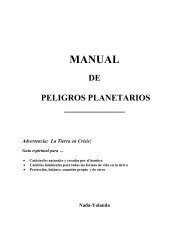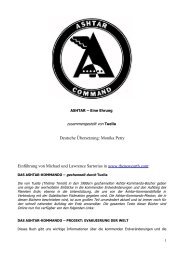ALIEN INTERVIEW - THE NEW EARTH - Earth Changes and The ...
ALIEN INTERVIEW - THE NEW EARTH - Earth Changes and The ...
ALIEN INTERVIEW - THE NEW EARTH - Earth Changes and The ...
Create successful ePaper yourself
Turn your PDF publications into a flip-book with our unique Google optimized e-Paper software.
"<strong>The</strong> Vedas (Sanskrit véda वेद "knowledge") are a large corpus of texts originating in Ancient<br />
India. <strong>The</strong>y form the oldest layer of Sanskrit literature <strong>and</strong> the oldest sacred texts of<br />
Hinduism. According to Hindu tradition, the Vedas are "not human compositions", being<br />
supposed to have been directly revealed, <strong>and</strong> thus are called śruti ("what is heard"). Vedic<br />
mantras are recited at Hindu prayers, religious functions <strong>and</strong> other auspicious occasions.<br />
Philosophies <strong>and</strong> sects that developed in the Indian subcontinent have taken differing<br />
positions on the Vedas. Schools of Indian philosophy which cite the Vedas as their scriptural<br />
authority are classified as "orthodox" (āstika). Other traditions, notably Buddhism <strong>and</strong><br />
Jainism, though they are (like the vedanta) similarly concerned with liberation did not regard<br />
the Vedas as divine ordinances but rather human expositions of the sphere of higher<br />
spiritual knowledge, hence not sacrosanct."<br />
-- Reference: Wikipedia.org<br />
190 "... the IS-BE who wrote a fictitious story one dark <strong>and</strong> stormy night..."<br />
Frankenstein: or, <strong>The</strong> Modern Prometheus is a novel written by the British author Mary<br />
Shelley. Shelley wrote the novel when she was 18 years old. <strong>The</strong> first edition was<br />
published anonymously in London in 1818. Shelley's name appears on the revised third<br />
edition, published in 1831. <strong>The</strong> title of the novel refers to a scientist, Victor Frankenstein,<br />
who learns how to create life <strong>and</strong> creates a being in the likeness of man, but larger than<br />
average <strong>and</strong> more powerful.<br />
<strong>The</strong> story has had an influence across literature <strong>and</strong> popular culture <strong>and</strong> spawned a<br />
complete genre of horror stories <strong>and</strong> films. It is arguably considered the first fully<br />
realized science fiction novel. <strong>The</strong> novel raises many issues that can be linked to<br />
today's society.<br />
During the rainy summer of 1816, the "Year Without a Summer," the world was locked<br />
in a long cold volcanic winter caused by the eruption of Mount Tambora in 1815. Mary<br />
Wollstonecraft Godwin, age 19, <strong>and</strong> her lover (<strong>and</strong> later husb<strong>and</strong>) Percy Bysshe Shelley,<br />
visited Lord Byron at the Villa Diodati by Lake Geneva in Switzerl<strong>and</strong>. <strong>The</strong> weather was<br />
consistently too cold <strong>and</strong> dreary that summer to enjoy the outdoor holiday activities they had<br />
planned, so the group retired indoors until almost dawn talking about science <strong>and</strong> the<br />
supernatural. After reading Fantasmagoriana, an anthology of German ghost stories,<br />
they challenged one another to each compose a story of their own, the contest being<br />
won by whoever wrote the scariest tale.<br />
Mary conceived an idea after she fell into a waking dream or nightmare during which<br />
she saw "the pale student of unhallowed arts kneeling beside the thing he had put<br />
together." Byron managed to write just a fragment based on the vampire legends he heard<br />
while travelling the Balkans, <strong>and</strong> from this Polidori created <strong>The</strong> Vampyre (1819), the<br />
progenitor of the romantic vampire literary genre. Two legendary horror tales originated from<br />
this one circumstance.<br />
Radu Florescu, in his book In Search of Frankenstein, argued that Mary <strong>and</strong> Percy Shelley<br />
visited Castle Frankenstein on their way to Switzerl<strong>and</strong>, near Darmstadt along the Rhine,<br />
where a notorious alchemist named Konrad Dippel had experimented with human bodies."<br />
-- Reference: Wikipedia.org<br />
286





